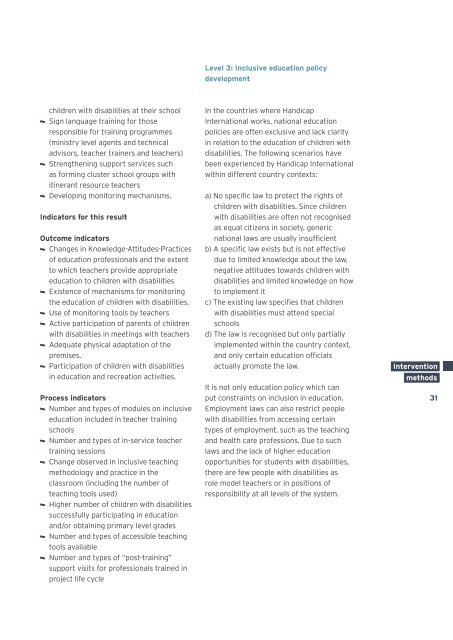Inclusive Education : Policy paper - Hiproweb.org
Inclusive Education : Policy paper - Hiproweb.org
Inclusive Education : Policy paper - Hiproweb.org
You also want an ePaper? Increase the reach of your titles
YUMPU automatically turns print PDFs into web optimized ePapers that Google loves.
Level 3: <strong>Inclusive</strong> education policy<br />
development<br />
children with disabilities at their school<br />
Sign language training for those<br />
responsible for training programmes<br />
(ministry level agents and technical<br />
advisors, teacher trainers and teachers)<br />
Strengthening support services such<br />
as forming cluster school groups with<br />
itinerant resource teachers<br />
Developing monitoring mechanisms.<br />
Indicators for this result<br />
Outcome indicators<br />
Changes in Knowledge-Attitudes-Practices<br />
of education professionals and the extent<br />
to which teachers provide appropriate<br />
education to children with disabilities<br />
Existence of mechanisms for monitoring<br />
the education of children with disabilities.<br />
Use of monitoring tools by teachers<br />
Active participation of parents of children<br />
with disabilities in meetings with teachers<br />
Adequate physical adaptation of the<br />
premises.<br />
Participation of children with disabilities<br />
in education and recreation activities.<br />
Process indicators<br />
Number and types of modules on inclusive<br />
education included in teacher training<br />
schools<br />
Number and types of in-service teacher<br />
training sessions<br />
Change observed in inclusive teaching<br />
methodology and practice in the<br />
classroom (including the number of<br />
teaching tools used)<br />
Higher number of children with disabilities<br />
successfully participating in education<br />
and/or obtaining primary level grades<br />
Number and types of accessible teaching<br />
tools available<br />
Number and types of “post-training”<br />
support visits for professionals trained in<br />
project life cycle<br />
In the countries where Handicap<br />
International works, national education<br />
policies are often exclusive and lack clarity<br />
in relation to the education of children with<br />
disabilities. The following scenarios have<br />
been experienced by Handicap International<br />
within different country contexts:<br />
a) No specific law to protect the rights of<br />
children with disabilities. Since children<br />
with disabilities are often not recognised<br />
as equal citizens in society, generic<br />
national laws are usually insufficient<br />
b) A specific law exists but is not effective<br />
due to limited knowledge about the law,<br />
negative attitudes towards children with<br />
disabilities and limited knowledge on how<br />
to implement it<br />
c) The existing law specifies that children<br />
with disabilities must attend special<br />
schools<br />
d) The law is recognised but only partially<br />
implemented within the country context,<br />
and only certain education officials<br />
actually promote the law.<br />
It is not only education policy which can<br />
put constraints on inclusion in education.<br />
Employment laws can also restrict people<br />
with disabilities from accessing certain<br />
types of employment, such as the teaching<br />
and health care professions. Due to such<br />
laws and the lack of higher education<br />
opportunities for students with disabilities,<br />
there are few people with disabilities as<br />
role model teachers or in positions of<br />
responsibility at all levels of the system.<br />
Intervention.<br />
methods .<br />
31

















